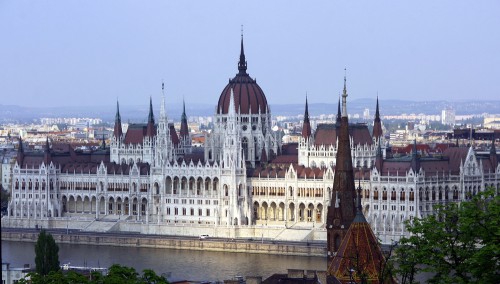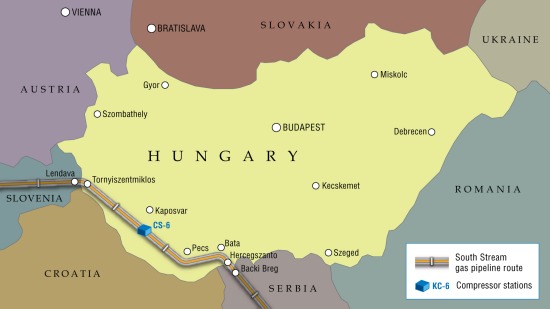jeudi, 23 janvier 2014
Hungary asserts its energy independence with South Stream

Hungary asserts its energy independence with South Stream
Ex: http://routemag.com
During recent talks in Budapest, the prime minister of Hungary, Viktor Orbán, and Gazprom’s CEO, Alexey Miller, announced that the construction of South Stream in Hungary will begin in April 2015. “We would like to see a South Stream on the territory of Hungary,” Orbán said. “It’s far better to have it running through the country than bypassing it.” Work completed on a tight schedule is a hopeful sign that both parties are taking their commitment to the project seriously.
Budapest’s decision may be “a final blow” to the delayed Nabucco pipeline, wrote Bloomberg. The Hungarian state secretary for energy affairs, Pál Kovács, was laconic when speaking about Nabucco as a potential alternative: “First of all, the international company <Nabucco> didn’t do everything it could have to ensure the success of this project. I must point out that apparently ten years was not enough time for them to put together a realistic and competitive concept; during that period they just wore everyone out and collected impressive fees and salaries, but after ten years we now have a clearer picture.”
At this point, South Stream is the only viable way for Hungary to solidify its position in the region as a transit power. South Stream Transport Hungary, a 50%-50% joint venture between Gazprom and the state-owned Hungarian Electricity Works (MVM), decided to finish construction in record time. The parties agreed to speed up the design and survey work, as well as the spatial planning and environmental impact assessment for the 229-kilometer-long Hungarian section of the South Stream. The first supplies of Russian natural gas are expected in Hungary as early as 2017. The National Development Ministry of Hungary claimed, “the country’s government will do everything in its power to remove any obstacles either to the realization of the South Stream gas pipeline or to the creation of a solution that is acceptable to all parties.”In other words, the investment environment in Hungary is ripe for development.
Energy cooperation will be definitely high on the agenda during Viktor Orbán’s present visit to Moscow. The two nations are in negotiations to upgrade Hungary’s only nuclear power plant, for which Russia plans to provide a EUR 10 billion loan. However, a significant focus will be on the South Stream project. Development Minister Zsuzsa Németh smoothed the way for the talks. In November at a conference titled “South Stream: The Evolution of a Pipeline,” she declared that all Hungarian energy solutions are developed in accord with the European Union energy policy, in order to ensure strong, long-term partnerships. [1]
Russia enjoys the unique status of being an important strategic partner for Hungary in matters pertaining to energy. In order to speed up coordination and implementation, the Hungarian government has declared South Stream to be a project of special importance to the national economy. In 2008, the then-prime minister, Ferenc Gyurcsány, and Vladimir Putin signed an agreement regarding Hungary’s participation in the Russian pipeline project. And in the summer of 2010, Orbán and his party Fidesz suddenly threw their political weight behind the deal with Russia. The prime minister of Hungary may use harsh rhetoric in his domestic policy, but he seems to understand the importance of taking a multi-pronged approach and diversifying his gas supplies.
Such a deliberate policy is not uncommon in Eastern Europe. South Stream may lack full backing at the EU level, but the most important regional players, such as Austria, see it as a cornerstone of European energy security. For example, Deutsche Welle has noted that Gerhard Mangott, a professor of political science at Innsbruck University and an established policy advisor, views the current critical position of the EU towards South Stream as questionable. According to Prof. Mangott, the South Stream project in fact increases the EU’s energy security. “This isn’t a matter of additional gas and increased dependency on Russia, rather this is an alternative pipeline, which is more modern and robust in type.”
Until very recently the European Commission had no objections to Hungary’s plans for energy independence. In his 2011 speech on South Stream, the EU commissioner for energypromised that “we <the European Commission> will not impose any unreasonable or unjustified level of administrative or regulatory requirements <on South Stream> and will act as fair partners. ”But today the relations between Budapest and Brussels are badly strained. Hungary’s sovereign government has been portrayed in the EU media as the community’s enfant terrible. One can only hope that the European Commission will respect Hungary’s sovereign energy policy, because a competitive approach and a transparent business environment rank high on the EU’s list of free-market values.
In no small measure the EU itself needs Russia’s natural gas to diversify its supplies and obtain clean fuel for its recovering industrial sector. Under such conditions it is counterproductive to burden a project that is in the interest of both parties with unnecessary red tape.Even worse, the bureaucratization (or, rather, eurocratization?) of South Stream seems to correlate with the ups and downs of Brussels’s foreign-policy strategy in Kyiv. As a result, the European Commission changes its bargaining position towards the continent’s largest infrastructure project depending on external political impulses. Is it fair to assume that the “invisible hand” of the European market was offended by failure in Kyiv?
[1] In 2012 Hungary received 5.3 billion cubic meters of natural gas from Russia.
00:05 Publié dans Actualité, Affaires européennes, Géopolitique | Lien permanent | Commentaires (0) | Tags : politique internationale, géopolitique, europe, affaires européennes, hongrie, south stream, gaz, gazoducs, hydrocarbures, europe centrale, mitteleuropa |  |
|  del.icio.us |
del.icio.us |  |
|  Digg |
Digg | ![]() Facebook
Facebook




Les commentaires sont fermés.